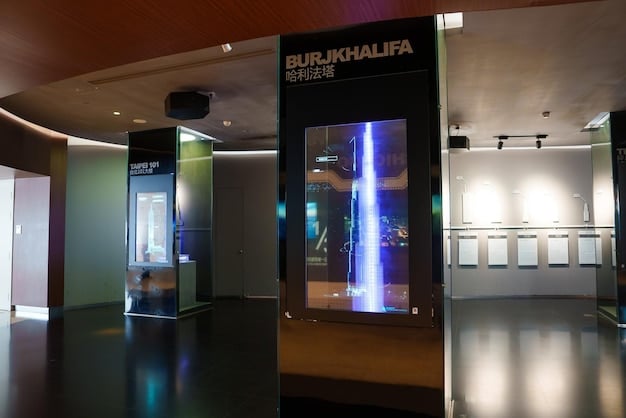The Influence of Social Media on Film Marketing: A 2025 Case Study

The Influence of Social Media on Film Marketing: A 2025 Case Study examines how platforms like TikTok, Instagram, and emerging metaverse technologies are reshaping movie promotion, audience engagement, and box office success, presenting both opportunities and challenges for studios and filmmakers.
The film industry is in constant evolution, and in 2025, the impact of social media on marketing strategies is undeniable. This is a deep dive into the influence of social media on film marketing today: A 2025 case study.
Understanding the Evolving Landscape of Film Marketing
The way films are marketed has changed significantly over the past decades. Traditional methods are combined with digital innovations. A closer look at a futuristic 2025 setting reveals what film marketing strategies are most effective.
The Shift from Traditional to Digital Marketing
Traditional film marketing relied heavily on television ads, billboards, and print publications. While these channels still have some relevance, budgets have shifted dramatically toward digital platforms.
In 2025, social media marketing dominates, offering opportunities for precision targeting and real-time interactions. Streaming platforms also play a crucial role, blurring the lines between film distribution and promotion.
The Rise of Influencer Marketing in Film
Influencer partnerships have become a staple in film marketing campaigns. These collaborations vary from celebrity endorsements to partnerships with niche content creators who can reach specific audiences.
In 2025, data-driven influencer selection and authentic engagement are key. Superficial endorsements are easily detected and can backfire. Brands must focus on genuine connections.
- Personalized Content: Tailored content for different platforms and demographics.
- Data and Analytics: Using data to optimize the timing of social media posts.
- Real-Time Engagement: Responding to comments, questions, and feedback promptly.
Consequently, film marketing is all about harnessing the digital landscape to reach audiences effectively. Social media usage is up; traditional advertising and influencer endorsements are becoming more sophisticated.

Social Media Platforms: The New Battlegrounds for Film Promotion
Social media platforms offer film marketers unprecedented access to potential viewers. These digital spaces provide diverse tools and strategies. Each platform has a unique appeal and user demographic.
TikTok’s Influence on Film Discovery
TikTok’s short-form video format has become a powerful tool for film discovery. Viral challenges, behind-the-scenes glimpses, and user-generated content can quickly elevate a film’s visibility.
In 2025, immersive and interactive TikTok campaigns will be the norm, with augmented reality (AR) filters and gamified content driving user engagement. Strategic use of hashtags and trending sounds remains crucial.
Instagram and Visual Storytelling
Instagram is a visual platform where film marketers can showcase stunning visuals. High-quality trailers, character posters, and production stills capture the attention of Instagram users.
Instagram Stories and Reels enable real-time engagement, allowing marketers to share updates and behind-the-scenes content. Influencer partnerships amplify reach and credibility.
The Metaverse and Immersive Film Experiences
The metaverse offers novel ways to engage potential moviegoers. Virtual film premieres, interactive poster exhibits, and digital environments provide viewers with immersive experiences.
In 2025, metaverse marketing campaigns integrate virtual reality (VR) and augmented reality (AR) technologies. Users can explore virtual sets, meet characters, and participate in exclusive events from the comfort of their homes.
Different online platforms offer unique capabilities and audiences for film promotions. These capabilities increase their efficiency.
Measuring the Success of Social Media Film Campaigns
Tracking performance metrics is vital for understanding the effectiveness of social media campaigns. Data-driven insights help marketers refine strategies. As a result, they can optimize resource allocation.
Key Performance Indicators (KPIs) for Film Marketing
Several KPIs can gauge the impact of a film’s social media marketing efforts. These include engagement rates, reach and impressions, website traffic, and conversion rates.
In 2025, sentiment analysis and social listening tools provide deeper insights into audience perceptions. By monitoring online conversations, marketers can identify both successes and areas for improvement.
Analyzing Engagement Rates and Audience Sentiment
Engagement rates, such as likes, shares, and comments, indicate how well content resonates with the audience. High engagement suggests that the content is relevant and compelling.
Sentiment analysis tools help gauge the overall tone of online discussions. It provides real-time feedback and allowing for adjustments. In this way, marketers can respond to potential crises.
Attribution Modeling and ROI Measurement
Attribution modeling identifies the touchpoints that contribute to conversion, such as ticket purchases or streaming subscriptions. This helps marketers understand which channels drive the most value.
In 2025, advanced analytics platforms provide comprehensive ROI measurement. It helps marketers justify their budgets and optimize spending.
- Engagement rates: Measuring audience interaction with content.
- Sentiment analysis: Gauging the tone of online discussions.
- Attribution modeling: Identifying key conversion touchpoints.

Understanding the effectiveness of film marketing campaigns requires the careful tracking of data and metrics. Consequently, social engagement is the metric to aim at.
Case Studies: Successful Social Media Film Campaigns in 2025
Examining successful campaigns provides insights into best practices and innovative strategies. These examples shed light on practical approaches. The approaches can be replicated and adapted for future film promotions.
“Echoes of Yesterday”: A TikTok Sensation
“Echoes of Yesterday,” is a low-budget indie film. Through a clever TikTok marketing campaign it achieved unexpected success. The campaign centered around a user-generated content challenge.
Viewers were invited to share their personal stories related to the film’s themes. The video with the most views and best overall reception won prizes. As a result of that, there was an increase in local attention and ticket sales.
“Starfall”: An Instagram-Driven Blockbuster
“Starfall,” a big-budget science fiction film, used Instagram to create anticipation and excitement. The marketing team had an agreement with visual storytellers to craft breathtaking imagery. With that, the production managed to capture the film’s world.
Behind-the-scenes content, character spotlights, and AR filters incentivized participation. The campaign also featured a collaboration with a popular science influencer.
“Cyberpunk Dreams”: A Metaverse Movie Premiere
“Cyberpunk Dreams,” a cyberpunk-themed thriller, held its premiere in a virtual metaverse. Fans got to explore a virtual city setting. Then, they interacted with digital avatars of the film’s characters.
The event gained media coverage and created a buzz. After this success, it attracted a global audience. It also allowed the film to establish itself very quickly.
- “Echoes of Yesterday”: A user-generated content challenge on TikTok.
- “Starfall”: A campaign with visual influencers on Instagram.
- “Cyberpunk Dreams”: A metaverse movie premiere.
The success of social media film campaigns in 2025. This shows the value of embracing new strategies to engage with consumers.
Challenges and Ethical Considerations in Social Media Film Marketing
While social media offers numerous opportunities, it also presents several challenges. Responsible marketing practices are essential. These ensure transparency and maintain consumer trust.
Combating Misinformation and Fake Reviews
The spread of false information and fake reviews can damage a film’s reputation. Proactive measures are needed. These measures detect and address misinformation promptly.
This includes partnerships with fact-checking organizations. As well as the implementation of detection on social media platforms. This way there is content moderation to verify information and combat bot activity.
Maintaining Authenticity and Transparency
Authenticity and transparency are important when working with influencers. Disclosing sponsored content maintains trust with viewers.
In 2025, regulations require clear and conspicuous disclosures. As a result of that regulation, influencer partnerships are now mandatory. The disclosures ensure viewers know that they are viewing promotional material.
Data Privacy and Ethical Data Collection
Data privacy is a growing concern for consumers. Film marketers must adhere to data protection regulations. As a result, they must avoid intrusive data collection practices.
This involves obtaining explicit consent. Giving viewers control over their data is becoming more and more important. It’s also important to be transparent about data usage policies.
- Combating misinformation: Proactive measures to detect and address false information.
- Maintaining authenticity: Clear disclosure of sponsored content.
- Data privacy: Adherence to data protection regulations.
Addressing challenges and ethical considerations is crucial for responsible film marketing. This strategy helps maintain consumer trust in film companies.
The Future of Social Media Marketing in Film
The future of social media film marketing is primed for innovation and transformation. AI and machine learning are poised to revolutionize the way films create social content. Emerging technologies will reshape the way people watch movies.
The Rise of AI-Driven Marketing Tools
AI-powered tools will have the ability to analyze vast amounts of data. These tools help marketers understand audience preferences. They will also help to personalize marketing messages.
This includes AI-generated content, predictive analytics, and automated social media management. These AI tools create more effective marketing campaigns.
Personalization and Hyper-Targeting Strategies
In 2025, personalized marketing campaigns will continue to rise. Hypertargeting involves delivering tailored messages to specific audience segments based on their behaviors, preferences, and demographics.
This requires sophisticated data analysis techniques and a deep understanding of the nuances of different social media platforms. This is made possible by new AI based data aggregation solutions.
Augmented Reality (AR) and Interactive Experiences
AR and interactive experiences will become increasingly common in film marketing. These technologies engage viewers in unique ways. And, they also create memorable brand interactions.
Augmented film trailers, virtual movie sets, and interactive characters create immersive experiences. These immersive experiences enhance excitement towards a new film through more effective channels. The channels will improve revenue from opening days.
- AI-driven tools: Personalized marketing content.
- Hyper-targeting: Personalized messaging for demographics.
- AR experiences: Interactive movie sets in augmented reality.
| Key Point | Brief Description |
|---|---|
| 🎬 Social Media’s Impact | Social platforms reshape film marketing, audience engagement, and box office success. |
| 📈 Measuring Campaign Success | KPIs include engagement rates, reach, and audience sentiment. |
| 🤖 AI and Personalization | AI drives personalization and hyper-targeting for film promotions. |
| 🌐 AR Experiences | Augmented Reality creates memorable experiences. |
FAQ Section
▼
Social media now plays a primary role in film marketing, influencing audience engagement and box office results. Platforms’ ad tools personalize content.
▼
Influencers act as powerful voices, helping to reach niche audiences. Data-driven influencer selection and authentic engagement will be key in 2025.
▼
Teams track engagement, reach, and website traffic. Sentiment analysis is used for deeper insights. ROI measurement is done with advanced analytics.
▼
Ethical concerns include misinformation and data privacy. Brands should address misinformation and provide clear disclosure of sponsored content.
▼
Expect personalized content, AI-driven insights, and hyper-targeting techniques. AR and VR technologies create immersive marketing experiences that bring viewers even closer.
Conclusion
In 2025, social media’s influence on film marketing is profound, shaping how films are promoted, discovered, and experienced. As technology and consumer behavior evolve, film marketers must adapt to stay ahead. In 2025, consumer trust and a good ROI are king.





